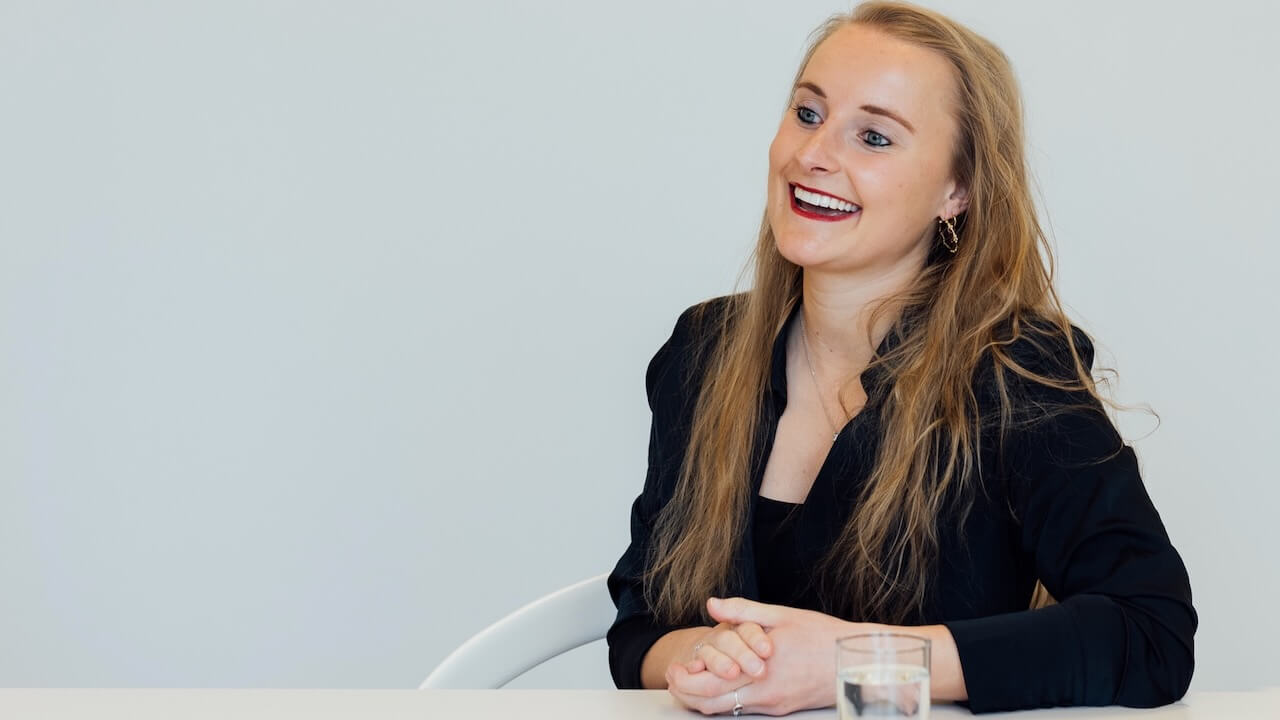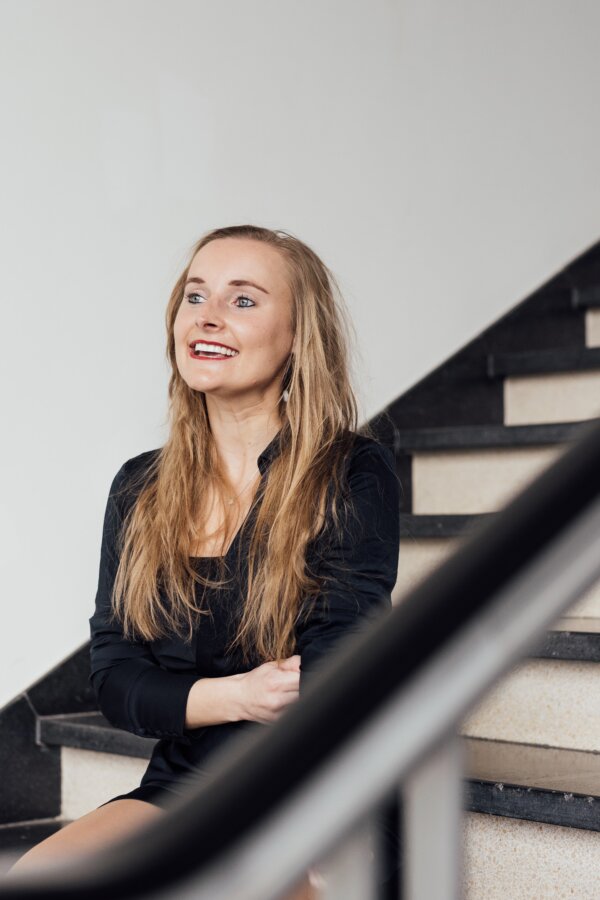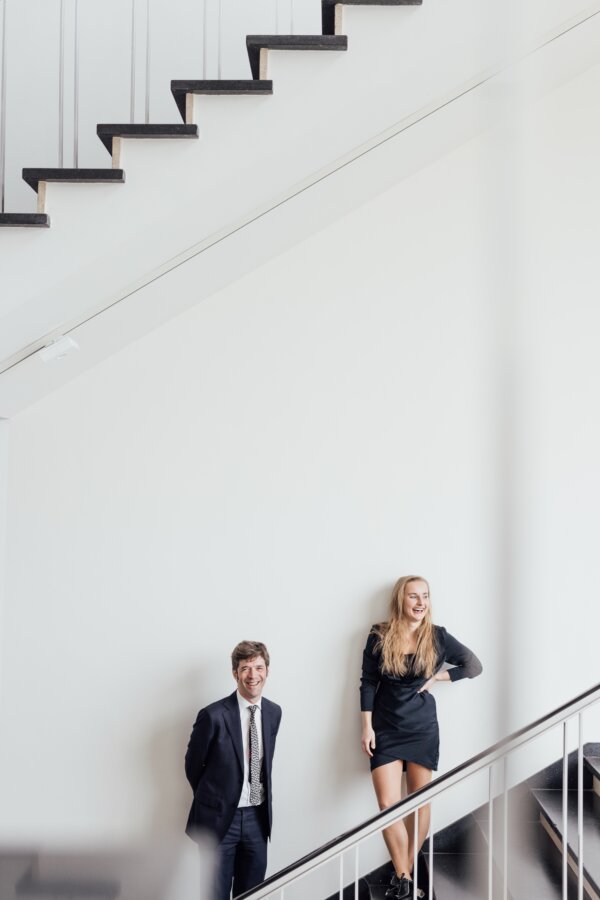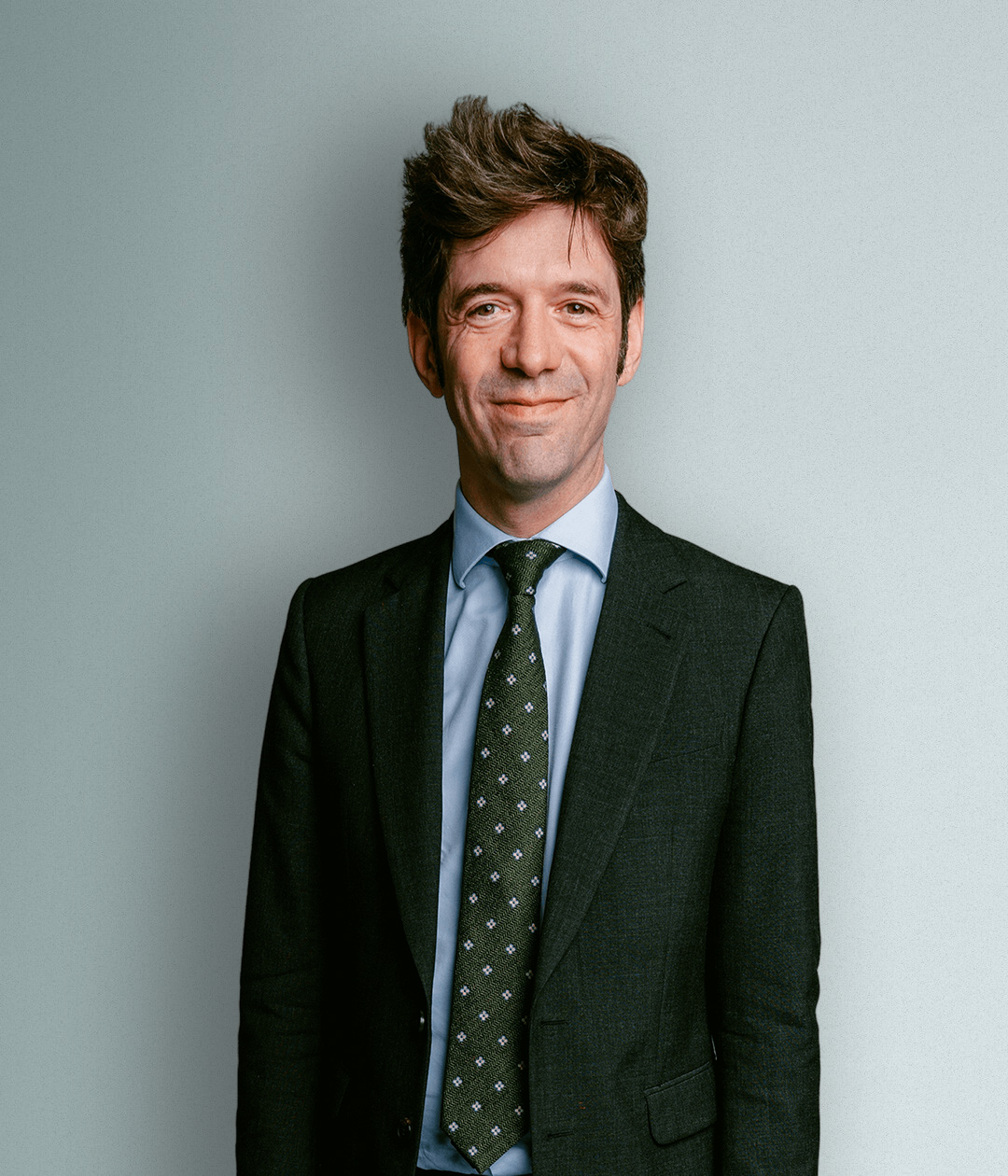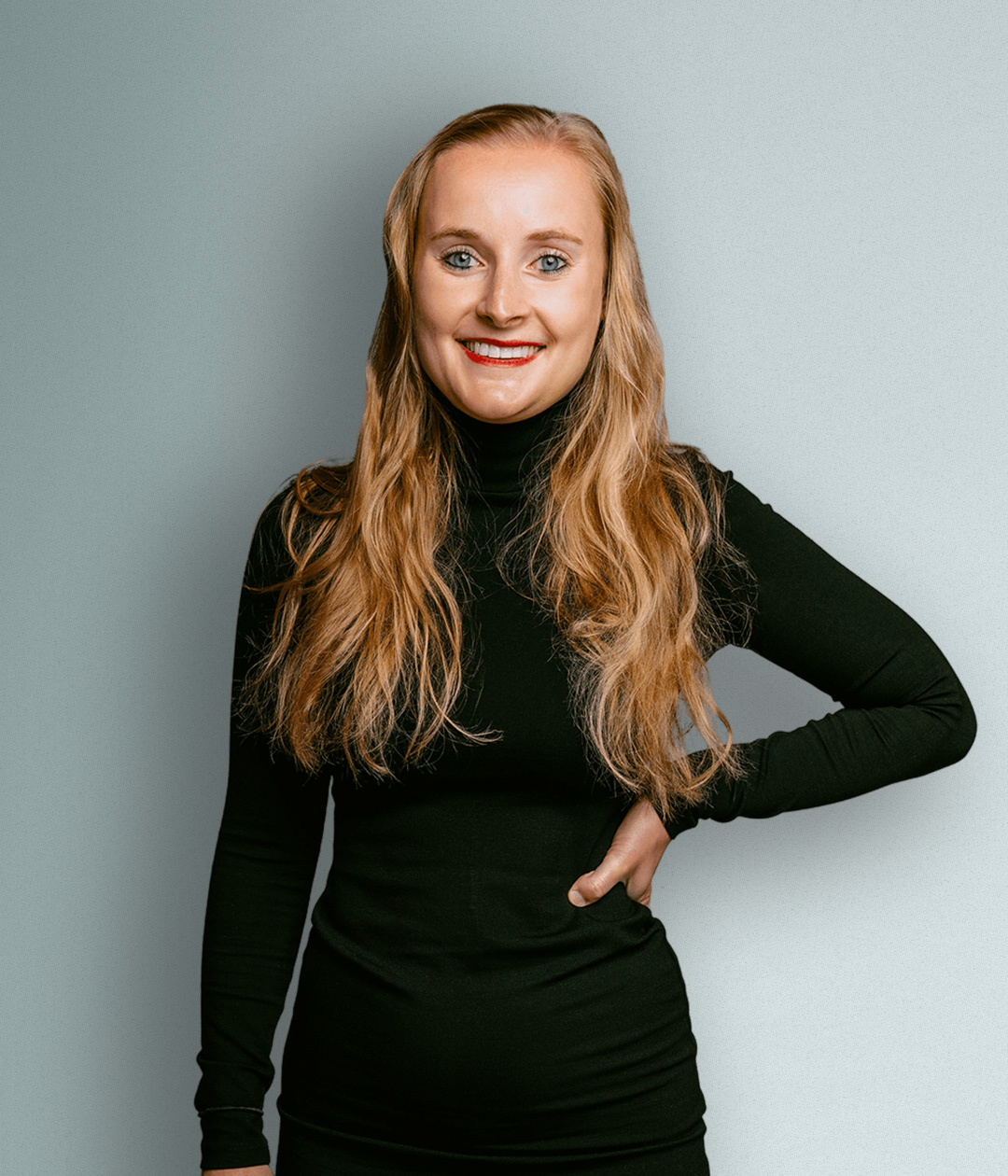Are you short on time? Here’s what you need to know:
- Eline has grown as a person during her traineeship. She learned to take on more responsibilities, to organize herself better, to produce more in-depth work, and to do more research work.
- Eline and Pieter complement each other very well. He has strong technical skills, and she is empathetic. Together, they’re very good at getting a technical message across clearly.
- At Monard Law, you’re instantly involved in client matters. Pieter’s clients are already contacting Eline directly.
- As a young lawyer, it’s important to take—and be given—the time and space you need. That way, you can try out everything and discover what you really want to do.
Read on and find out more.
A short introduction before we begin:
Eline De Schepper completed her Master of Laws degree at Ghent University. She then went to the Université Paris II Sorbonne for an LL.M. in International Business Law and studied at the INSEAD campus in Singapore. For her three-year traineeship for bar admission, she chose Monard Law’s tax law team led by Pieter Van Den Berghe. Read more >
Pieter Van Den Berghe, partner at Monard Law, mainly handles corporate tax and international tax law. He’s a specialist in the Belgian innovation income deduction. Read more >
“I’m spontaneous and speak my mind, so I find it important that people can express themselves openly at the firm and that I can be myself there. And that is exactly what I’ve found here.”
Hello Eline, what a nice journey you’ve made! From Ghent to Paris and even Singapore. Why did you choose Monard Law to do your traineeship?
Eline: “I find the humane aspect very important to me. Every trainee lawyer has their own preference and looks for the type of firm that matches him or her. I’m spontaneous and speak my mind, so I find it important that people can express themselves openly at the firm and that I can be myself there. And that is exactly what I’ve found here. The atmosphere is great. I instantly felt we matched at my interview.”
You find humanity important to you. How is Monard Law a humane law firm?
Eline: “Everyone here is very accessible: from juniors and seniors to partners. Because of that, the atmosphere among all the colleagues here is very nice. The open culture enables you to ask anyone questions about anything. And whenever firm-wide events and activities are organized, it’s always very enjoyable. There are also many other trainees whom you have contact with. I find that fantastic here.”
“Monard Law is more personal than large-scale firms, and you can rely on more areas of expertise and people than in smaller firms.”
Pieter, what qualities did you see immediately in Eline?
Eline: “Now I’m curious. (laughs) I’m all ears!”
Pieter: “Eline is incredibly quick and very communicative, and that surely brings added value to the matters we work on. I appreciate her contribution greatly. She also checks my work. Our workflow when we cooperate certainly does not go in one direction only, and I like that a lot. I’m very lucky to have Eline on my team.”
“We’re also not a huge law firm that recruit a pool of trainees and then stand back, watch, and ask ourselves: ‘will they swim or drown?’ For us, both sides must feel good about it. As partners and senior practitioners, we invest in trainees. If you join us, everyone will do everything they can to make it work.”
“I know if Eline handles certain tasks that it will be good at the client’s end.”
Are there certain tasks in which Eline’s “quick” and “communicative” abilities come to the fore?
Pieter: “I’ve built up a relationship of trust with my clients throughout the years. If you have a good team, which is what we have here with Eline, you’ll have no problems with putting her in charge of a part of the communication. The fact that you have nothing to worry about is very reassuring. I know if Eline handles certain tasks that it will be good at the client’s end.”
Eline, what skills were you able to develop during your traineeship?
Eline: “I’ve especially grown as a person. I’ve learned to take on more responsibilities, to organize myself better, to produce more in-depth work, and to do more research work. In the beginning, I found everything to be quite straightforward, and I often followed my gut instinct.”
Pieter: “Or you just jotted down whatever I said, right?” (laughs)
Eline: “(laughs) Yes, that too. In one of the earlier days when I started working with Pieter, I suggested something to him. He said, “Why do you think that that must be so?” I answered, “Because that’s just what I’m thinking.” He said, “Well, perhaps you should look that up before you think that.” That’s one of the things I’ve learned in the meantime: that you shouldn’t just ‘think’ but also ‘look it up’.”
“That is also a very important skill for my pro bono cases because I myself am responsible for them from beginning to end. If I work for Pieter’s clients, he checks my work before it is sent. For a pro bono matter, that’s not so. That’s why it’s also very important to do the necessary research work. That way, you’re certain about your case before you go to court or before you formulate an advice for your client.”
“As partners and senior practitioners, we invest in trainees. If you join us, everyone will do everything they can to make it work.”
Why do you find Monard Law to be a nice place to do a traineeship?
Eline: “The work is great. You get to be hands on in no time. You’re assigned matters and you’re given the right guidance to do them well. You get a lot of responsibilities, and you can join in on meetings at client offices, so you’re not doing pure research work. That’s good because that allows you to be part of the entire process. That’s also interesting in terms of contact with clients because then you learn that much faster.”
“Plus, what I already mentioned, the social aspect. The atmosphere is very good here. They’re really committed to this. I find that important too. Now and then a trip here or a party there. And we’re given certain responsibilities in those events. You gain strengths throughout by being involved, and that’s fantastic.”
“The fact that you can assist others and can mean something to them makes it all worthwhile to me.”
What are you most proud of from your traineeship?
Eline: “Especially the growth that I’ve experienced. The fact that I can already take on and be given more responsibilities, that I can follow up my case files better, that I can work more thoroughly, be forward-thinking, … I find these very important already. The fact that you become more mature, that you learn to stand up for yourself. Not just lean backwards and wait until someone hands me something on a silver platter. But take the initiative to do something by myself and for myself. That’s what I’m most proud of.”
Pieter: “Or that clients ask you questions directly …”
Eline: “Yes, that Pieter’s clients contact me directly. I think it’s great that they trust me. The fact that you can assist others and can mean something to them makes it all worthwhile to me.”
What was more difficult than you thought?
Eline: “I found many things to be more difficult than I thought. For example, writing an email. (laughs) I thought that I had written a very good email and I sent this to Pieter to have him check it. In the end, he kept only the greeting and the closing and he threw out everything in between.”
Pieter: “There’s some art in that, you know. But the first time that an email can be sent out without any changes that’s satisfying too, right?”
Eline: “Indeed, that is. And if Pieter says to me now: ‘Go ahead and send this email out.’ Then I’d say to myself: ‘Wow, I did this all by myself?’ (laughs)”
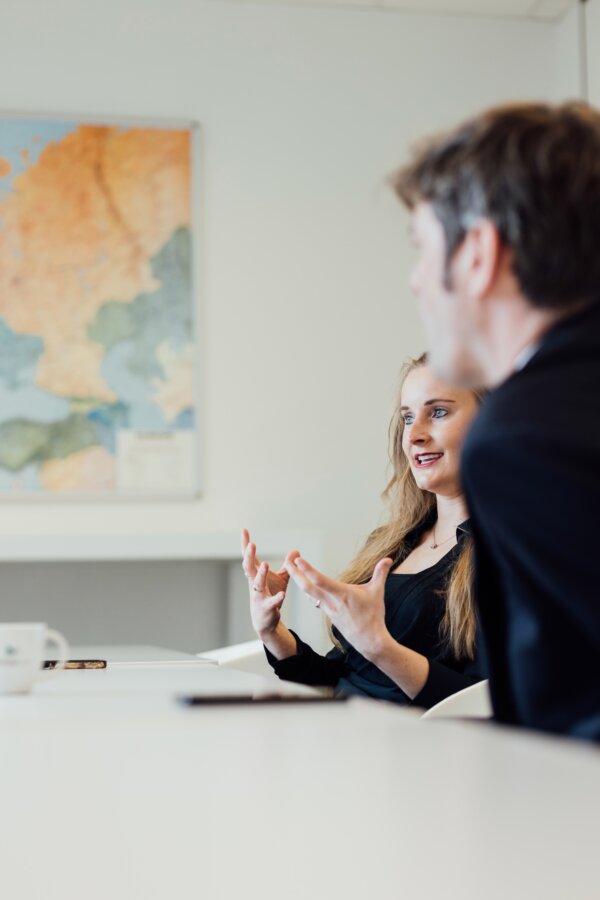
What is the most important lesson you learned from Pieter during your traineeship?
Eline: “To be more meticulous in my work and not get satisfied too quickly. Pieter is more mindful. He reviews everything like eight times, while for me, I’d say to myself in the third round: ‘it’s good’.”
Pieter: “And to check everything as well. Not just following your instincts. You must really go and check it because law provisions are changing too.”
Pieter, what did you learn from Eline?
Pieter: “Eline is very empathetic, so she has another perspective on a matter. I’d have an idea of what the next step could be, but Eline enables me to see that it won’t work sometimes. She also has another way of communicating, which makes the outcome different from what I would have done, had I done it my way. The ‘non-legal’ parts are often very important in a matter: how do you formulate it, what is the final objective, what are the steps, how do you get there? And your communication in the whole process is very important.”
Eline: “Pieter is very technical, and I’m good at formulating things. So we’re very good at getting a technical message across clearly. It must also be clear for every type of client, not only for companies with a large tax team.”
I get it: you complement each other very well, and you enable each other to have new insights.
Pieter: “That’s the essence.” (laughs)
Eline, how would you want to continue to grow in the team?
Eline: “To become more independent, to handle more matters (smaller ones) by myself, to speak out more at meetings. I do talk a lot now, but at meetings, when Pieter is speaking, it is difficult to jump in and say something. (laughs) And definitely to continue blossoming. And regarding what I want to specialize in, I still have to think about that.”
Pieter: “A specialization is not something you choose in a hurry.”
Eline: “I now try to work on as many different types of matters as possible, and I want to continue doing that. Because that’s how you learn whether you want to specialize in some particular area. You can think of many things that you consider interesting, but by actually doing it in practice is how you find out if it’s something for you.”
Pieter: “If you, as a young lawyer, make specific choices too quickly, that can be detrimental in the long run. It’s good to take (and be given) the time and space to try out everything. I’d like Eline to make those choices by herself and not rely on me when doing it.”
“The most important thing for a lawyer, besides the firm and specialization, is your own reputation and the building of relationships and the ability to make your own choices. This independence is very important.”
To round up, Pieter, what do you wish for Eline for the rest of her career?
Pieter: “The most important thing for a lawyer, besides the firm and specialization, is your own reputation and the building of relationships and the ability to make your own choices. This independence is very important. As a firm, we try to encourage that, but that is also something you must seize yourself. This is the only way that will enable you to keep up and function in the long run.”
“As a trainee, you still rely on others to a certain extent. And depending on the work to be done, you rely on the firm or your partner or colleagues. When you do gain this independence and you produce the work by yourself, you enjoy doing that in the way you want it and for a good purpose, then I believe you have made it as a lawyer. And I certainly wish that for you.”
